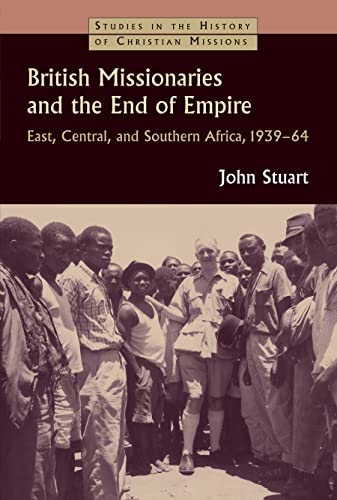British Missionaries and the End of Empire: East, Central, and Southern Africa, 1939–1964
Written by John Stuart Reviewed By Ray PorterThis book covers a narrow range historically and geographically, but it raises larger questions about what role, if any, missionaries should have in the political affairs of the countries in which they work. Africa was a target for both British missionaries and British colonialism. This book seeks to chart the interrelationship between the missionaries, the colonial government, and the emerging churches. With few exceptions the missionaries are revealed as playing little direct role in the path towards the independence of African countries. Many were not concerned to think about the Africans as people with political ambitions or those who were resentful of colonialism. They were concerned with the task of preaching the gospel message and establishing the church or churches. When issues arose, most of them acted in accordance with the preconceptions of their own class or inherited politics. Many of them had personal contacts and shared backgrounds with politicians and seemed to have expected, often erroneously, that their local knowledge would have a part in political considerations. Sometimes they discovered too late what was going on in the hearts and minds of their congregations, and although often sympathetic to Africans' concerns, they failed to supply the necessary support at the right time. They had great concerns about the effect on their ministry of any political position. South Africa, as it moved towards apartheid, is always there in the background.
Stuart has given us a good systematic account of what took place, wisely using source materials found in the archives of various Mission Agencies. Many of the leaders of the emerging nations had had the benefit of missionary school education and some had a personal Christian commitment. But what is missing from this book, and probably from the events it describes, is any theological discussion of the role of Christians in the struggle for political liberation from the colonial powers. Even more seriously there seems to have been little real biblical study by evangelicals of the role of race and its implications for inter-racial relationships within the church and state. As Stuart remarks, the missionaries were very often responding to events in an ad hoc fashion and there was not a planned construction of an indigenous church. The true merger of African thought and Christian fervour is probably to be found in the independent churches rather than those that still owe their structures to European patterns. The lack of real theological political thought is probably still to be observed in the lack of biblically based state building in Africa today.
This book will appeal most to those with an interest in the history of African missions. The issues that were faced by the missionaries were particular to that period of the end of colonialism, but the issue of the interface between Christian mission and political ideas is still one that needs to be considered in many parts of the world where the church is growing and active. The research presented in this book can contribute to that discussion.
Ray Porter
Ray Porter
Oak Hill College
London, England, UK
Other Articles in this Issue
Some of the most valuable and lasting contributions made to the Christian faith have come through Christian scholarship...
Music, singing and emotions: what are the connections? The question is by no means new, but it’s certainly one that has received renewed attention in recent times...
In his influential address, “Discourse on the Proper Distinction between Biblical and Dogmatic Theology, and the Right Determination of the Aims of Each,” Johann Philipp Gabler (1753–1826) lodged the programmatic proposal that scholars ought to distinguish between biblical and systematic theology...
One of the most unnerving things you can read is John Milton’s great poem Paradise Lost...
Since The Intolerance of Tolerance was published, readers have been sending me new examples they have spotted-examples of egregious intolerance masquerading in the name of tolerance...







